Evaluating Consumer Decision-Making in Hospitality: A Detailed Report
VerifiedAdded on 2023/01/05
|13
|3832
|95
Report
AI Summary
This report provides a comprehensive analysis of consumer behaviour within the hospitality sector, focusing on Claridge Hotel as a case study. It investigates the cultural, social, personal, and psychological factors influencing consumer attitudes and behaviours, along with the impact of digital technology on changing consumer trends. The report examines the stages of the consumer decision-making journey, mapping a path to purchase for hospitality services, and highlights the importance of understanding consumer decision-making for marketers. Furthermore, it compares and contrasts the key differences in the hospitality decision-making process between B2C and B2B contexts, evaluates different market research approaches, and assesses how marketers can influence various stages of the decision-making process. The analysis emphasizes the importance of adapting to evolving consumer needs and leveraging digital technology to enhance customer satisfaction and organizational performance.
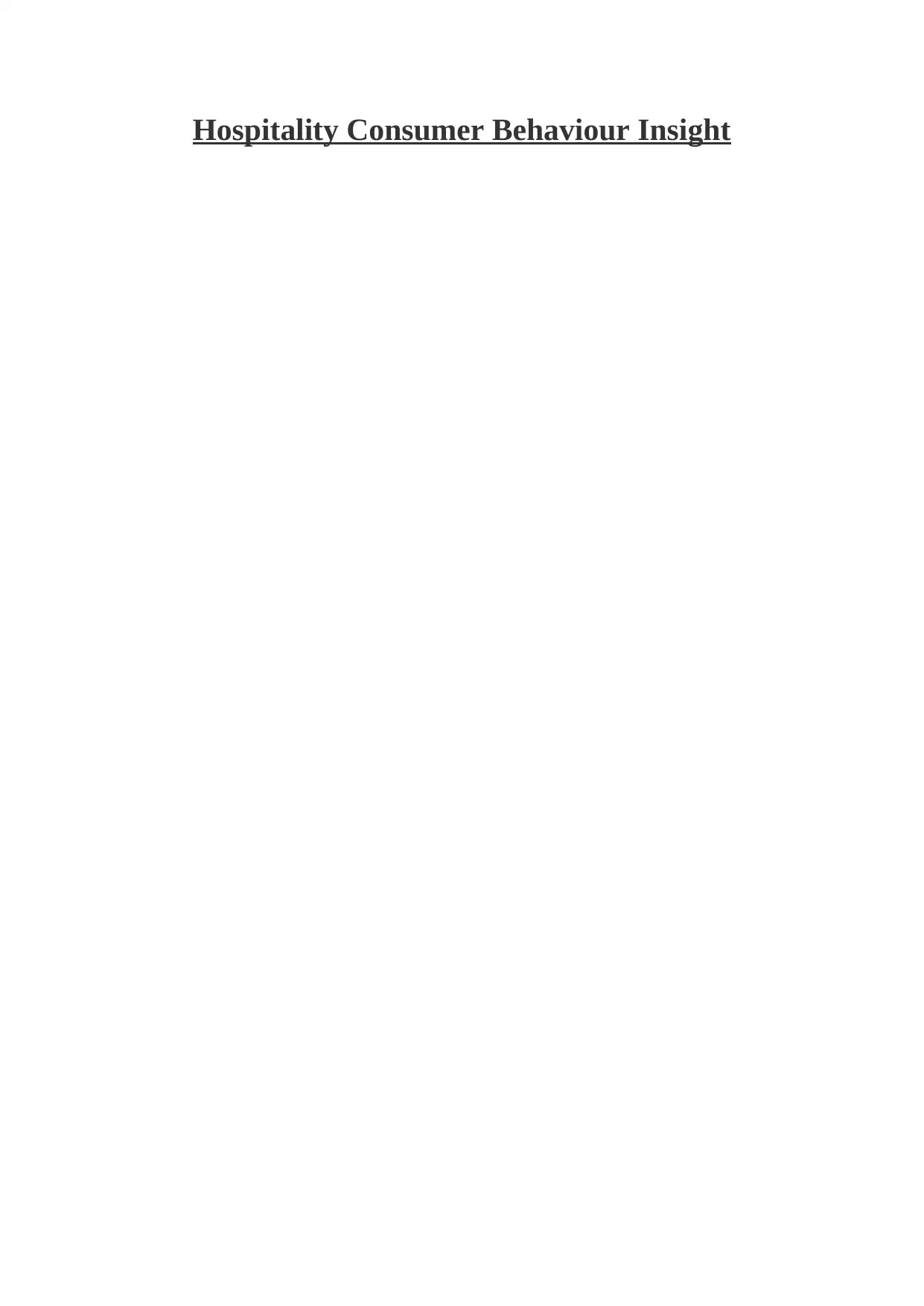
Hospitality Consumer Behaviour Insight
Paraphrase This Document
Need a fresh take? Get an instant paraphrase of this document with our AI Paraphraser
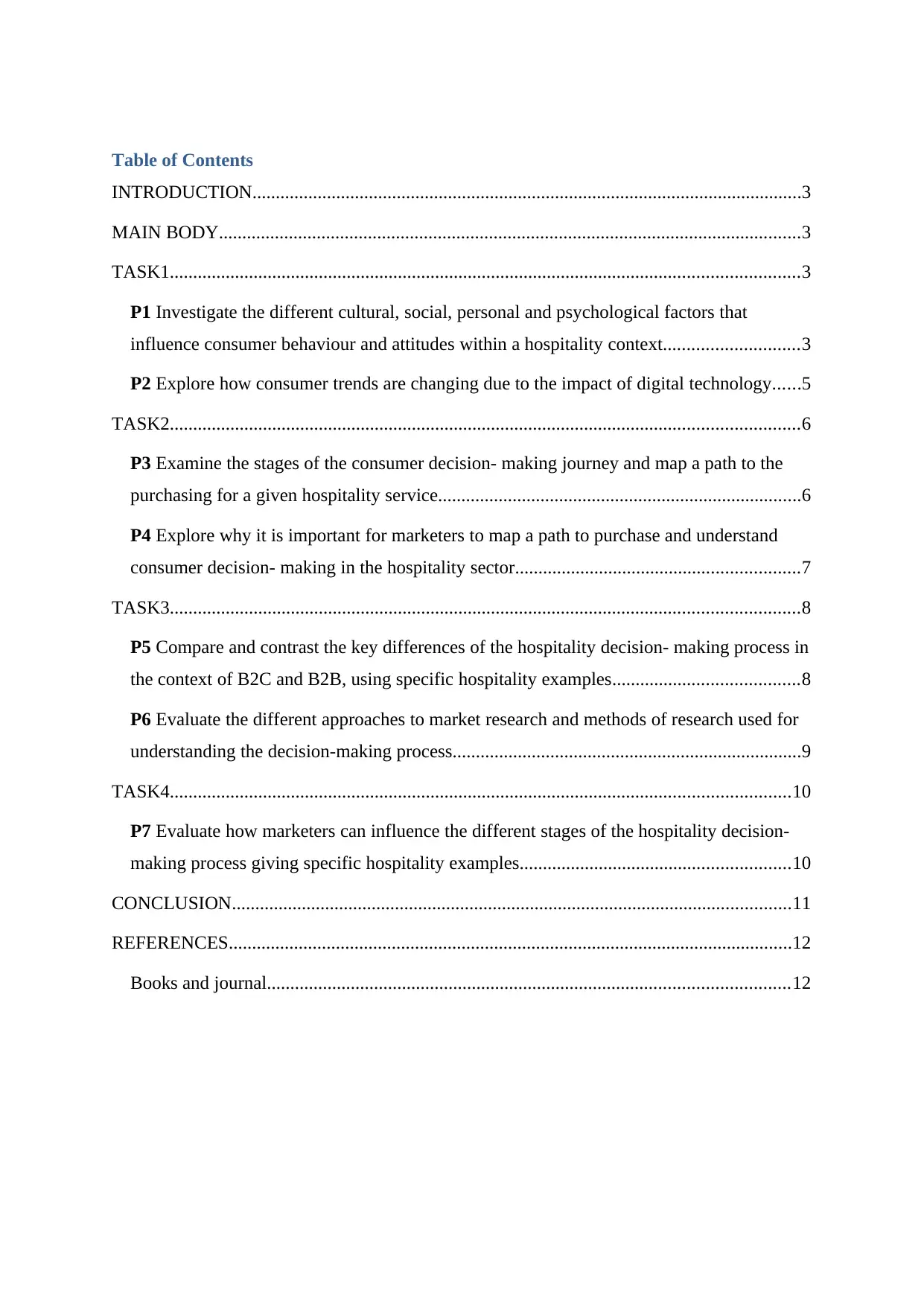
Table of Contents
INTRODUCTION......................................................................................................................3
MAIN BODY.............................................................................................................................3
TASK1.......................................................................................................................................3
P1 Investigate the different cultural, social, personal and psychological factors that
influence consumer behaviour and attitudes within a hospitality context.............................3
P2 Explore how consumer trends are changing due to the impact of digital technology......5
TASK2.......................................................................................................................................6
P3 Examine the stages of the consumer decision- making journey and map a path to the
purchasing for a given hospitality service..............................................................................6
P4 Explore why it is important for marketers to map a path to purchase and understand
consumer decision- making in the hospitality sector.............................................................7
TASK3.......................................................................................................................................8
P5 Compare and contrast the key differences of the hospitality decision- making process in
the context of B2C and B2B, using specific hospitality examples........................................8
P6 Evaluate the different approaches to market research and methods of research used for
understanding the decision-making process...........................................................................9
TASK4.....................................................................................................................................10
P7 Evaluate how marketers can influence the different stages of the hospitality decision-
making process giving specific hospitality examples..........................................................10
CONCLUSION........................................................................................................................11
REFERENCES.........................................................................................................................12
Books and journal................................................................................................................12
INTRODUCTION......................................................................................................................3
MAIN BODY.............................................................................................................................3
TASK1.......................................................................................................................................3
P1 Investigate the different cultural, social, personal and psychological factors that
influence consumer behaviour and attitudes within a hospitality context.............................3
P2 Explore how consumer trends are changing due to the impact of digital technology......5
TASK2.......................................................................................................................................6
P3 Examine the stages of the consumer decision- making journey and map a path to the
purchasing for a given hospitality service..............................................................................6
P4 Explore why it is important for marketers to map a path to purchase and understand
consumer decision- making in the hospitality sector.............................................................7
TASK3.......................................................................................................................................8
P5 Compare and contrast the key differences of the hospitality decision- making process in
the context of B2C and B2B, using specific hospitality examples........................................8
P6 Evaluate the different approaches to market research and methods of research used for
understanding the decision-making process...........................................................................9
TASK4.....................................................................................................................................10
P7 Evaluate how marketers can influence the different stages of the hospitality decision-
making process giving specific hospitality examples..........................................................10
CONCLUSION........................................................................................................................11
REFERENCES.........................................................................................................................12
Books and journal................................................................................................................12
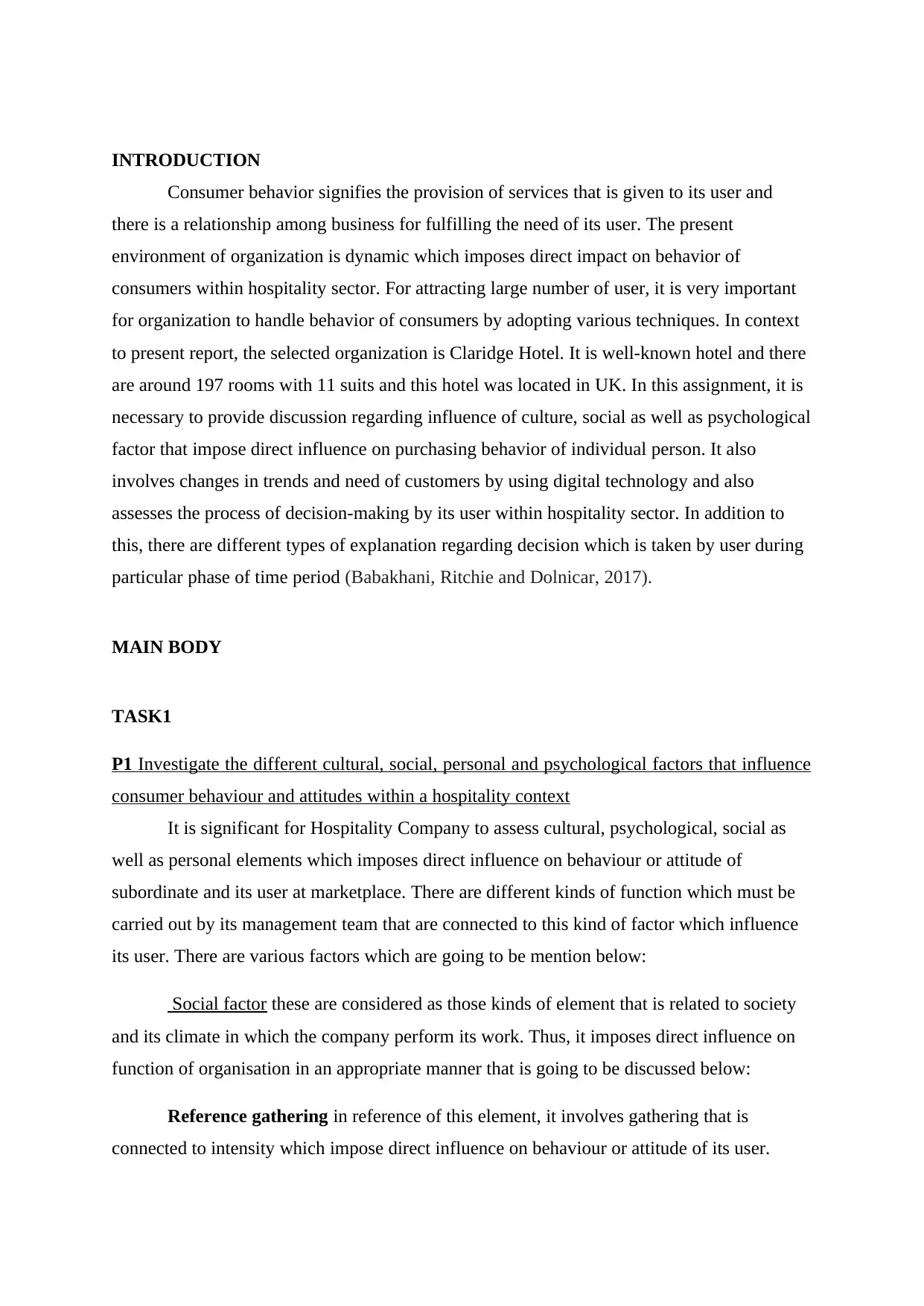
INTRODUCTION
Consumer behavior signifies the provision of services that is given to its user and
there is a relationship among business for fulfilling the need of its user. The present
environment of organization is dynamic which imposes direct impact on behavior of
consumers within hospitality sector. For attracting large number of user, it is very important
for organization to handle behavior of consumers by adopting various techniques. In context
to present report, the selected organization is Claridge Hotel. It is well-known hotel and there
are around 197 rooms with 11 suits and this hotel was located in UK. In this assignment, it is
necessary to provide discussion regarding influence of culture, social as well as psychological
factor that impose direct influence on purchasing behavior of individual person. It also
involves changes in trends and need of customers by using digital technology and also
assesses the process of decision-making by its user within hospitality sector. In addition to
this, there are different types of explanation regarding decision which is taken by user during
particular phase of time period (Babakhani, Ritchie and Dolnicar, 2017).
MAIN BODY
TASK1
P1 Investigate the different cultural, social, personal and psychological factors that influence
consumer behaviour and attitudes within a hospitality context
It is significant for Hospitality Company to assess cultural, psychological, social as
well as personal elements which imposes direct influence on behaviour or attitude of
subordinate and its user at marketplace. There are different kinds of function which must be
carried out by its management team that are connected to this kind of factor which influence
its user. There are various factors which are going to be mention below:
Social factor these are considered as those kinds of element that is related to society
and its climate in which the company perform its work. Thus, it imposes direct influence on
function of organisation in an appropriate manner that is going to be discussed below:
Reference gathering in reference of this element, it involves gathering that is
connected to intensity which impose direct influence on behaviour or attitude of its user.
Consumer behavior signifies the provision of services that is given to its user and
there is a relationship among business for fulfilling the need of its user. The present
environment of organization is dynamic which imposes direct impact on behavior of
consumers within hospitality sector. For attracting large number of user, it is very important
for organization to handle behavior of consumers by adopting various techniques. In context
to present report, the selected organization is Claridge Hotel. It is well-known hotel and there
are around 197 rooms with 11 suits and this hotel was located in UK. In this assignment, it is
necessary to provide discussion regarding influence of culture, social as well as psychological
factor that impose direct influence on purchasing behavior of individual person. It also
involves changes in trends and need of customers by using digital technology and also
assesses the process of decision-making by its user within hospitality sector. In addition to
this, there are different types of explanation regarding decision which is taken by user during
particular phase of time period (Babakhani, Ritchie and Dolnicar, 2017).
MAIN BODY
TASK1
P1 Investigate the different cultural, social, personal and psychological factors that influence
consumer behaviour and attitudes within a hospitality context
It is significant for Hospitality Company to assess cultural, psychological, social as
well as personal elements which imposes direct influence on behaviour or attitude of
subordinate and its user at marketplace. There are different kinds of function which must be
carried out by its management team that are connected to this kind of factor which influence
its user. There are various factors which are going to be mention below:
Social factor these are considered as those kinds of element that is related to society
and its climate in which the company perform its work. Thus, it imposes direct influence on
function of organisation in an appropriate manner that is going to be discussed below:
Reference gathering in reference of this element, it involves gathering that is
connected to intensity which impose direct influence on behaviour or attitude of its user.
⊘ This is a preview!⊘
Do you want full access?
Subscribe today to unlock all pages.

Trusted by 1+ million students worldwide
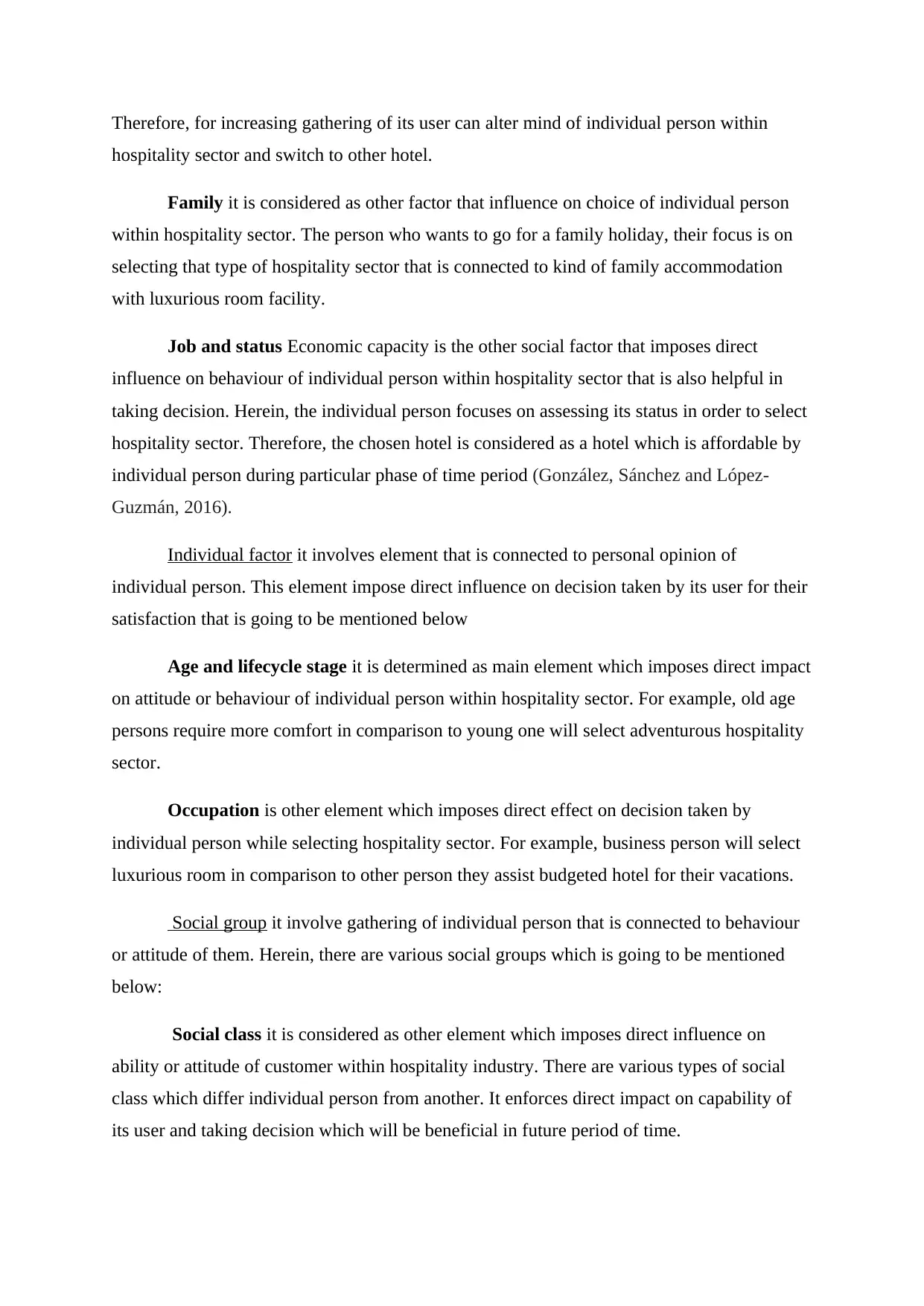
Therefore, for increasing gathering of its user can alter mind of individual person within
hospitality sector and switch to other hotel.
Family it is considered as other factor that influence on choice of individual person
within hospitality sector. The person who wants to go for a family holiday, their focus is on
selecting that type of hospitality sector that is connected to kind of family accommodation
with luxurious room facility.
Job and status Economic capacity is the other social factor that imposes direct
influence on behaviour of individual person within hospitality sector that is also helpful in
taking decision. Herein, the individual person focuses on assessing its status in order to select
hospitality sector. Therefore, the chosen hotel is considered as a hotel which is affordable by
individual person during particular phase of time period (González, Sánchez and López-
Guzmán, 2016).
Individual factor it involves element that is connected to personal opinion of
individual person. This element impose direct influence on decision taken by its user for their
satisfaction that is going to be mentioned below
Age and lifecycle stage it is determined as main element which imposes direct impact
on attitude or behaviour of individual person within hospitality sector. For example, old age
persons require more comfort in comparison to young one will select adventurous hospitality
sector.
Occupation is other element which imposes direct effect on decision taken by
individual person while selecting hospitality sector. For example, business person will select
luxurious room in comparison to other person they assist budgeted hotel for their vacations.
Social group it involve gathering of individual person that is connected to behaviour
or attitude of them. Herein, there are various social groups which is going to be mentioned
below:
Social class it is considered as other element which imposes direct influence on
ability or attitude of customer within hospitality industry. There are various types of social
class which differ individual person from another. It enforces direct impact on capability of
its user and taking decision which will be beneficial in future period of time.
hospitality sector and switch to other hotel.
Family it is considered as other factor that influence on choice of individual person
within hospitality sector. The person who wants to go for a family holiday, their focus is on
selecting that type of hospitality sector that is connected to kind of family accommodation
with luxurious room facility.
Job and status Economic capacity is the other social factor that imposes direct
influence on behaviour of individual person within hospitality sector that is also helpful in
taking decision. Herein, the individual person focuses on assessing its status in order to select
hospitality sector. Therefore, the chosen hotel is considered as a hotel which is affordable by
individual person during particular phase of time period (González, Sánchez and López-
Guzmán, 2016).
Individual factor it involves element that is connected to personal opinion of
individual person. This element impose direct influence on decision taken by its user for their
satisfaction that is going to be mentioned below
Age and lifecycle stage it is determined as main element which imposes direct impact
on attitude or behaviour of individual person within hospitality sector. For example, old age
persons require more comfort in comparison to young one will select adventurous hospitality
sector.
Occupation is other element which imposes direct effect on decision taken by
individual person while selecting hospitality sector. For example, business person will select
luxurious room in comparison to other person they assist budgeted hotel for their vacations.
Social group it involve gathering of individual person that is connected to behaviour
or attitude of them. Herein, there are various social groups which is going to be mentioned
below:
Social class it is considered as other element which imposes direct influence on
ability or attitude of customer within hospitality industry. There are various types of social
class which differ individual person from another. It enforces direct impact on capability of
its user and taking decision which will be beneficial in future period of time.
Paraphrase This Document
Need a fresh take? Get an instant paraphrase of this document with our AI Paraphraser
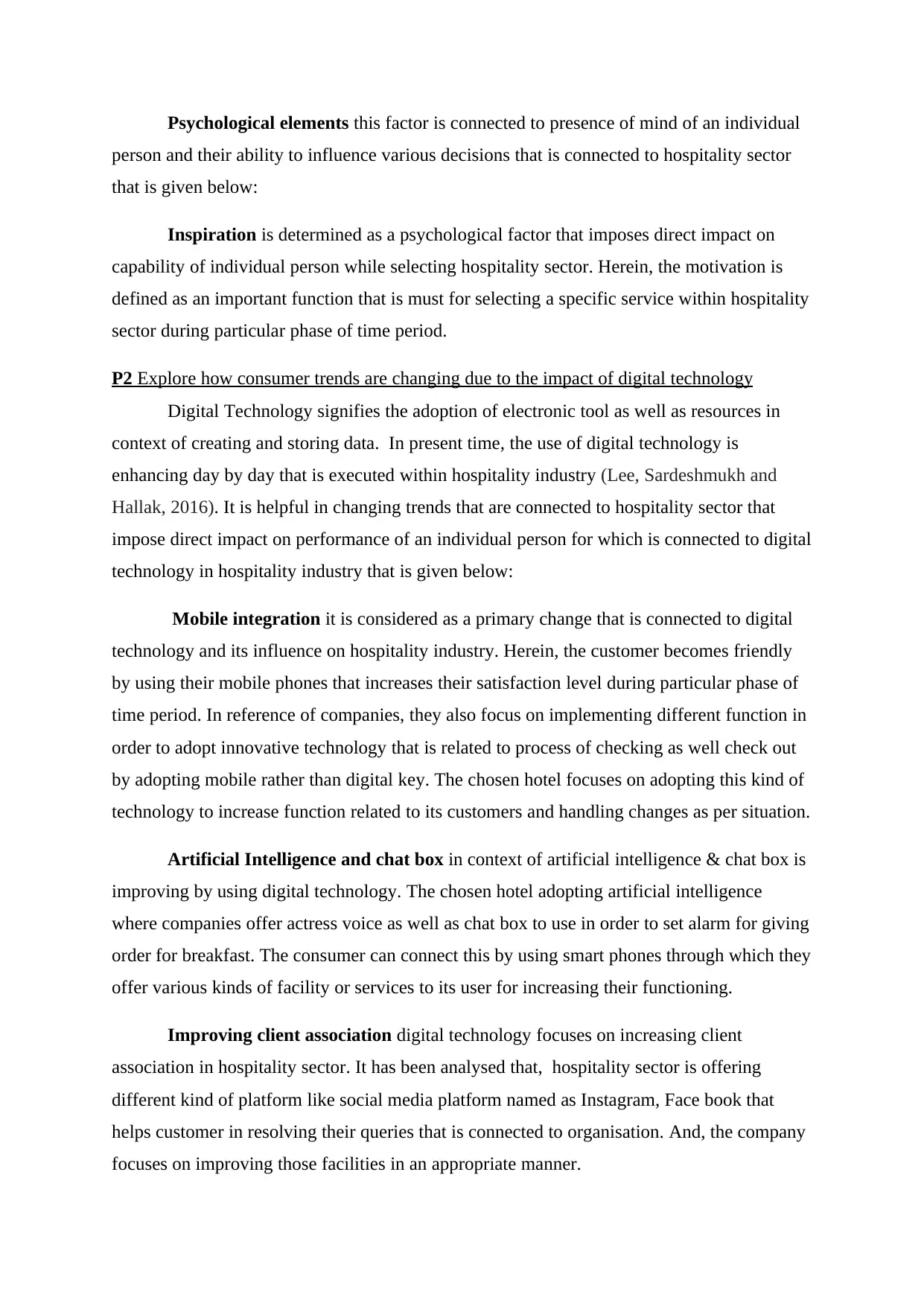
Psychological elements this factor is connected to presence of mind of an individual
person and their ability to influence various decisions that is connected to hospitality sector
that is given below:
Inspiration is determined as a psychological factor that imposes direct impact on
capability of individual person while selecting hospitality sector. Herein, the motivation is
defined as an important function that is must for selecting a specific service within hospitality
sector during particular phase of time period.
P2 Explore how consumer trends are changing due to the impact of digital technology
Digital Technology signifies the adoption of electronic tool as well as resources in
context of creating and storing data. In present time, the use of digital technology is
enhancing day by day that is executed within hospitality industry (Lee, Sardeshmukh and
Hallak, 2016). It is helpful in changing trends that are connected to hospitality sector that
impose direct impact on performance of an individual person for which is connected to digital
technology in hospitality industry that is given below:
Mobile integration it is considered as a primary change that is connected to digital
technology and its influence on hospitality industry. Herein, the customer becomes friendly
by using their mobile phones that increases their satisfaction level during particular phase of
time period. In reference of companies, they also focus on implementing different function in
order to adopt innovative technology that is related to process of checking as well check out
by adopting mobile rather than digital key. The chosen hotel focuses on adopting this kind of
technology to increase function related to its customers and handling changes as per situation.
Artificial Intelligence and chat box in context of artificial intelligence & chat box is
improving by using digital technology. The chosen hotel adopting artificial intelligence
where companies offer actress voice as well as chat box to use in order to set alarm for giving
order for breakfast. The consumer can connect this by using smart phones through which they
offer various kinds of facility or services to its user for increasing their functioning.
Improving client association digital technology focuses on increasing client
association in hospitality sector. It has been analysed that, hospitality sector is offering
different kind of platform like social media platform named as Instagram, Face book that
helps customer in resolving their queries that is connected to organisation. And, the company
focuses on improving those facilities in an appropriate manner.
person and their ability to influence various decisions that is connected to hospitality sector
that is given below:
Inspiration is determined as a psychological factor that imposes direct impact on
capability of individual person while selecting hospitality sector. Herein, the motivation is
defined as an important function that is must for selecting a specific service within hospitality
sector during particular phase of time period.
P2 Explore how consumer trends are changing due to the impact of digital technology
Digital Technology signifies the adoption of electronic tool as well as resources in
context of creating and storing data. In present time, the use of digital technology is
enhancing day by day that is executed within hospitality industry (Lee, Sardeshmukh and
Hallak, 2016). It is helpful in changing trends that are connected to hospitality sector that
impose direct impact on performance of an individual person for which is connected to digital
technology in hospitality industry that is given below:
Mobile integration it is considered as a primary change that is connected to digital
technology and its influence on hospitality industry. Herein, the customer becomes friendly
by using their mobile phones that increases their satisfaction level during particular phase of
time period. In reference of companies, they also focus on implementing different function in
order to adopt innovative technology that is related to process of checking as well check out
by adopting mobile rather than digital key. The chosen hotel focuses on adopting this kind of
technology to increase function related to its customers and handling changes as per situation.
Artificial Intelligence and chat box in context of artificial intelligence & chat box is
improving by using digital technology. The chosen hotel adopting artificial intelligence
where companies offer actress voice as well as chat box to use in order to set alarm for giving
order for breakfast. The consumer can connect this by using smart phones through which they
offer various kinds of facility or services to its user for increasing their functioning.
Improving client association digital technology focuses on increasing client
association in hospitality sector. It has been analysed that, hospitality sector is offering
different kind of platform like social media platform named as Instagram, Face book that
helps customer in resolving their queries that is connected to organisation. And, the company
focuses on improving those facilities in an appropriate manner.
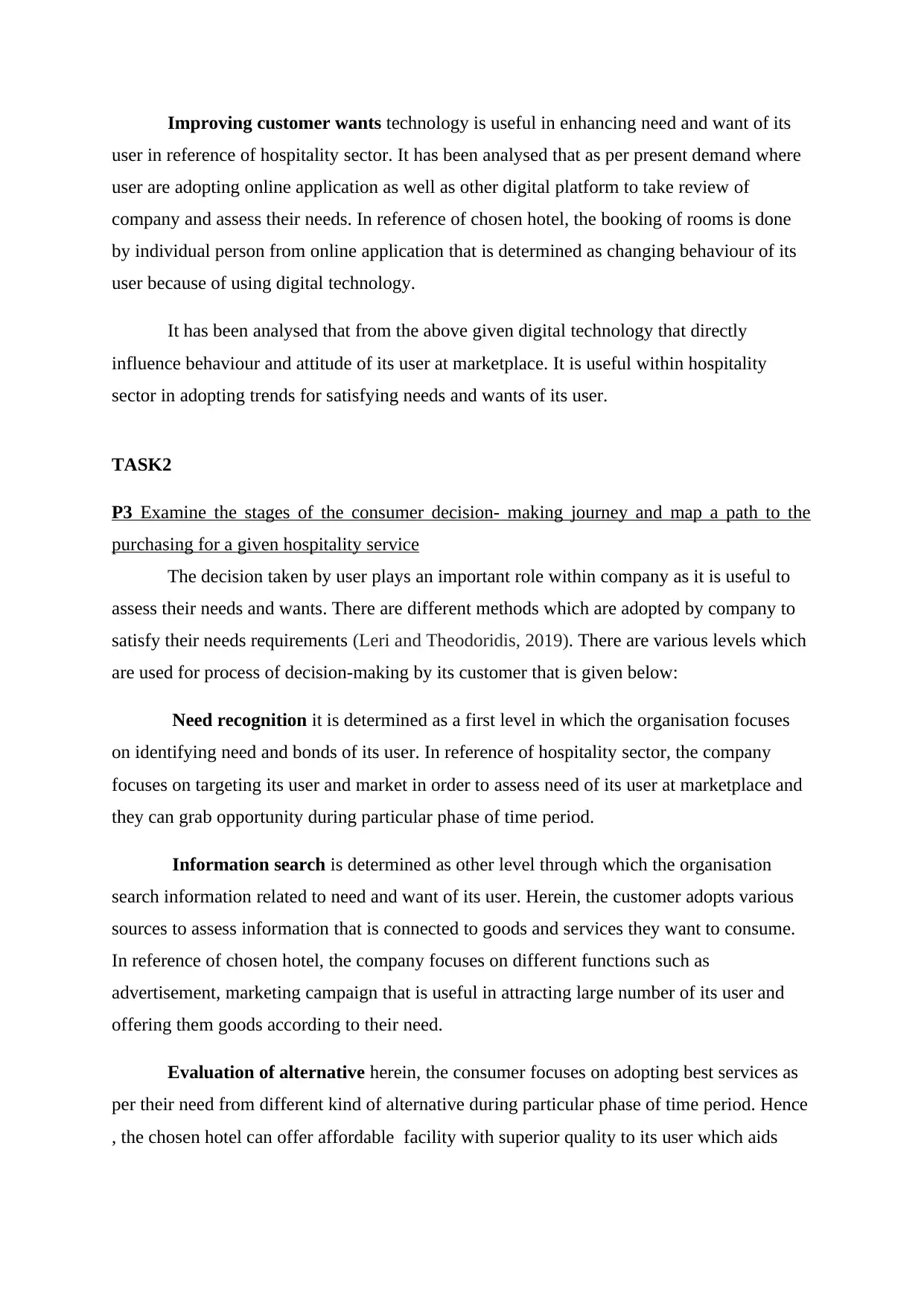
Improving customer wants technology is useful in enhancing need and want of its
user in reference of hospitality sector. It has been analysed that as per present demand where
user are adopting online application as well as other digital platform to take review of
company and assess their needs. In reference of chosen hotel, the booking of rooms is done
by individual person from online application that is determined as changing behaviour of its
user because of using digital technology.
It has been analysed that from the above given digital technology that directly
influence behaviour and attitude of its user at marketplace. It is useful within hospitality
sector in adopting trends for satisfying needs and wants of its user.
TASK2
P3 Examine the stages of the consumer decision- making journey and map a path to the
purchasing for a given hospitality service
The decision taken by user plays an important role within company as it is useful to
assess their needs and wants. There are different methods which are adopted by company to
satisfy their needs requirements (Leri and Theodoridis, 2019). There are various levels which
are used for process of decision-making by its customer that is given below:
Need recognition it is determined as a first level in which the organisation focuses
on identifying need and bonds of its user. In reference of hospitality sector, the company
focuses on targeting its user and market in order to assess need of its user at marketplace and
they can grab opportunity during particular phase of time period.
Information search is determined as other level through which the organisation
search information related to need and want of its user. Herein, the customer adopts various
sources to assess information that is connected to goods and services they want to consume.
In reference of chosen hotel, the company focuses on different functions such as
advertisement, marketing campaign that is useful in attracting large number of its user and
offering them goods according to their need.
Evaluation of alternative herein, the consumer focuses on adopting best services as
per their need from different kind of alternative during particular phase of time period. Hence
, the chosen hotel can offer affordable facility with superior quality to its user which aids
user in reference of hospitality sector. It has been analysed that as per present demand where
user are adopting online application as well as other digital platform to take review of
company and assess their needs. In reference of chosen hotel, the booking of rooms is done
by individual person from online application that is determined as changing behaviour of its
user because of using digital technology.
It has been analysed that from the above given digital technology that directly
influence behaviour and attitude of its user at marketplace. It is useful within hospitality
sector in adopting trends for satisfying needs and wants of its user.
TASK2
P3 Examine the stages of the consumer decision- making journey and map a path to the
purchasing for a given hospitality service
The decision taken by user plays an important role within company as it is useful to
assess their needs and wants. There are different methods which are adopted by company to
satisfy their needs requirements (Leri and Theodoridis, 2019). There are various levels which
are used for process of decision-making by its customer that is given below:
Need recognition it is determined as a first level in which the organisation focuses
on identifying need and bonds of its user. In reference of hospitality sector, the company
focuses on targeting its user and market in order to assess need of its user at marketplace and
they can grab opportunity during particular phase of time period.
Information search is determined as other level through which the organisation
search information related to need and want of its user. Herein, the customer adopts various
sources to assess information that is connected to goods and services they want to consume.
In reference of chosen hotel, the company focuses on different functions such as
advertisement, marketing campaign that is useful in attracting large number of its user and
offering them goods according to their need.
Evaluation of alternative herein, the consumer focuses on adopting best services as
per their need from different kind of alternative during particular phase of time period. Hence
, the chosen hotel can offer affordable facility with superior quality to its user which aids
⊘ This is a preview!⊘
Do you want full access?
Subscribe today to unlock all pages.

Trusted by 1+ million students worldwide
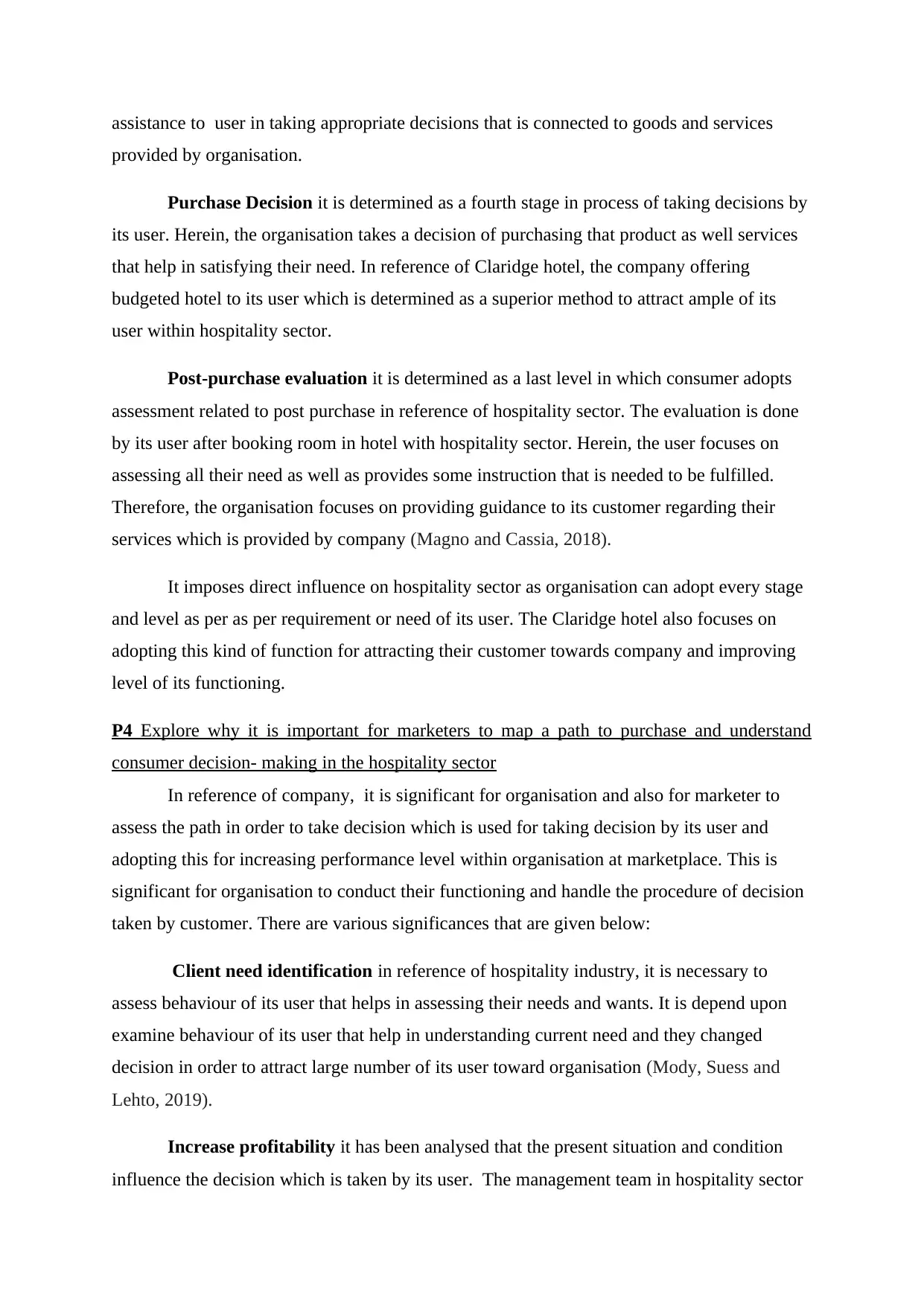
assistance to user in taking appropriate decisions that is connected to goods and services
provided by organisation.
Purchase Decision it is determined as a fourth stage in process of taking decisions by
its user. Herein, the organisation takes a decision of purchasing that product as well services
that help in satisfying their need. In reference of Claridge hotel, the company offering
budgeted hotel to its user which is determined as a superior method to attract ample of its
user within hospitality sector.
Post-purchase evaluation it is determined as a last level in which consumer adopts
assessment related to post purchase in reference of hospitality sector. The evaluation is done
by its user after booking room in hotel with hospitality sector. Herein, the user focuses on
assessing all their need as well as provides some instruction that is needed to be fulfilled.
Therefore, the organisation focuses on providing guidance to its customer regarding their
services which is provided by company (Magno and Cassia, 2018).
It imposes direct influence on hospitality sector as organisation can adopt every stage
and level as per as per requirement or need of its user. The Claridge hotel also focuses on
adopting this kind of function for attracting their customer towards company and improving
level of its functioning.
P4 Explore why it is important for marketers to map a path to purchase and understand
consumer decision- making in the hospitality sector
In reference of company, it is significant for organisation and also for marketer to
assess the path in order to take decision which is used for taking decision by its user and
adopting this for increasing performance level within organisation at marketplace. This is
significant for organisation to conduct their functioning and handle the procedure of decision
taken by customer. There are various significances that are given below:
Client need identification in reference of hospitality industry, it is necessary to
assess behaviour of its user that helps in assessing their needs and wants. It is depend upon
examine behaviour of its user that help in understanding current need and they changed
decision in order to attract large number of its user toward organisation (Mody, Suess and
Lehto, 2019).
Increase profitability it has been analysed that the present situation and condition
influence the decision which is taken by its user. The management team in hospitality sector
provided by organisation.
Purchase Decision it is determined as a fourth stage in process of taking decisions by
its user. Herein, the organisation takes a decision of purchasing that product as well services
that help in satisfying their need. In reference of Claridge hotel, the company offering
budgeted hotel to its user which is determined as a superior method to attract ample of its
user within hospitality sector.
Post-purchase evaluation it is determined as a last level in which consumer adopts
assessment related to post purchase in reference of hospitality sector. The evaluation is done
by its user after booking room in hotel with hospitality sector. Herein, the user focuses on
assessing all their need as well as provides some instruction that is needed to be fulfilled.
Therefore, the organisation focuses on providing guidance to its customer regarding their
services which is provided by company (Magno and Cassia, 2018).
It imposes direct influence on hospitality sector as organisation can adopt every stage
and level as per as per requirement or need of its user. The Claridge hotel also focuses on
adopting this kind of function for attracting their customer towards company and improving
level of its functioning.
P4 Explore why it is important for marketers to map a path to purchase and understand
consumer decision- making in the hospitality sector
In reference of company, it is significant for organisation and also for marketer to
assess the path in order to take decision which is used for taking decision by its user and
adopting this for increasing performance level within organisation at marketplace. This is
significant for organisation to conduct their functioning and handle the procedure of decision
taken by customer. There are various significances that are given below:
Client need identification in reference of hospitality industry, it is necessary to
assess behaviour of its user that helps in assessing their needs and wants. It is depend upon
examine behaviour of its user that help in understanding current need and they changed
decision in order to attract large number of its user toward organisation (Mody, Suess and
Lehto, 2019).
Increase profitability it has been analysed that the present situation and condition
influence the decision which is taken by its user. The management team in hospitality sector
Paraphrase This Document
Need a fresh take? Get an instant paraphrase of this document with our AI Paraphraser
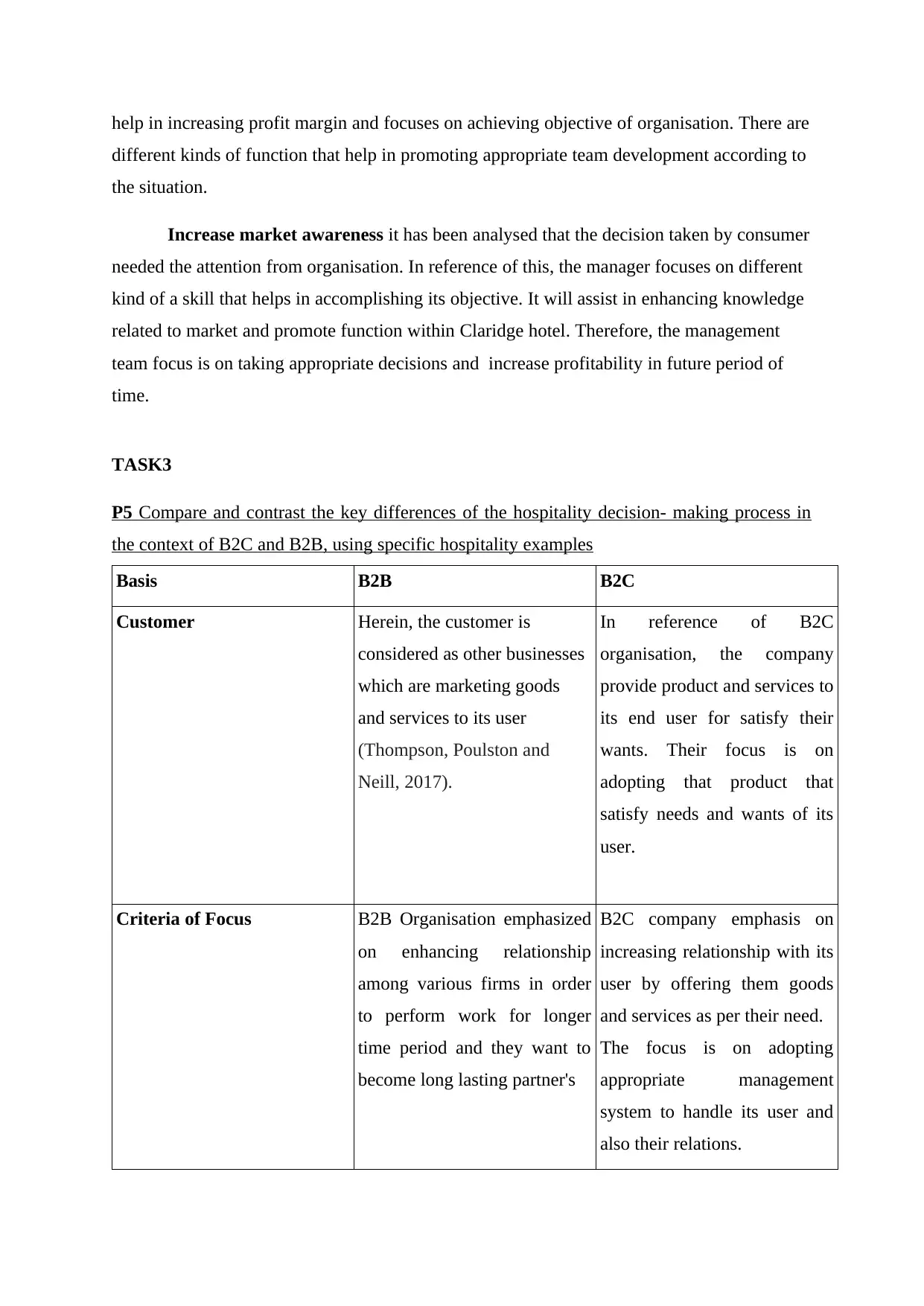
help in increasing profit margin and focuses on achieving objective of organisation. There are
different kinds of function that help in promoting appropriate team development according to
the situation.
Increase market awareness it has been analysed that the decision taken by consumer
needed the attention from organisation. In reference of this, the manager focuses on different
kind of a skill that helps in accomplishing its objective. It will assist in enhancing knowledge
related to market and promote function within Claridge hotel. Therefore, the management
team focus is on taking appropriate decisions and increase profitability in future period of
time.
TASK3
P5 Compare and contrast the key differences of the hospitality decision- making process in
the context of B2C and B2B, using specific hospitality examples
Basis B2B B2C
Customer Herein, the customer is
considered as other businesses
which are marketing goods
and services to its user
(Thompson, Poulston and
Neill, 2017).
In reference of B2C
organisation, the company
provide product and services to
its end user for satisfy their
wants. Their focus is on
adopting that product that
satisfy needs and wants of its
user.
Criteria of Focus B2B Organisation emphasized
on enhancing relationship
among various firms in order
to perform work for longer
time period and they want to
become long lasting partner's
B2C company emphasis on
increasing relationship with its
user by offering them goods
and services as per their need.
The focus is on adopting
appropriate management
system to handle its user and
also their relations.
different kinds of function that help in promoting appropriate team development according to
the situation.
Increase market awareness it has been analysed that the decision taken by consumer
needed the attention from organisation. In reference of this, the manager focuses on different
kind of a skill that helps in accomplishing its objective. It will assist in enhancing knowledge
related to market and promote function within Claridge hotel. Therefore, the management
team focus is on taking appropriate decisions and increase profitability in future period of
time.
TASK3
P5 Compare and contrast the key differences of the hospitality decision- making process in
the context of B2C and B2B, using specific hospitality examples
Basis B2B B2C
Customer Herein, the customer is
considered as other businesses
which are marketing goods
and services to its user
(Thompson, Poulston and
Neill, 2017).
In reference of B2C
organisation, the company
provide product and services to
its end user for satisfy their
wants. Their focus is on
adopting that product that
satisfy needs and wants of its
user.
Criteria of Focus B2B Organisation emphasized
on enhancing relationship
among various firms in order
to perform work for longer
time period and they want to
become long lasting partner's
B2C company emphasis on
increasing relationship with its
user by offering them goods
and services as per their need.
The focus is on adopting
appropriate management
system to handle its user and
also their relations.
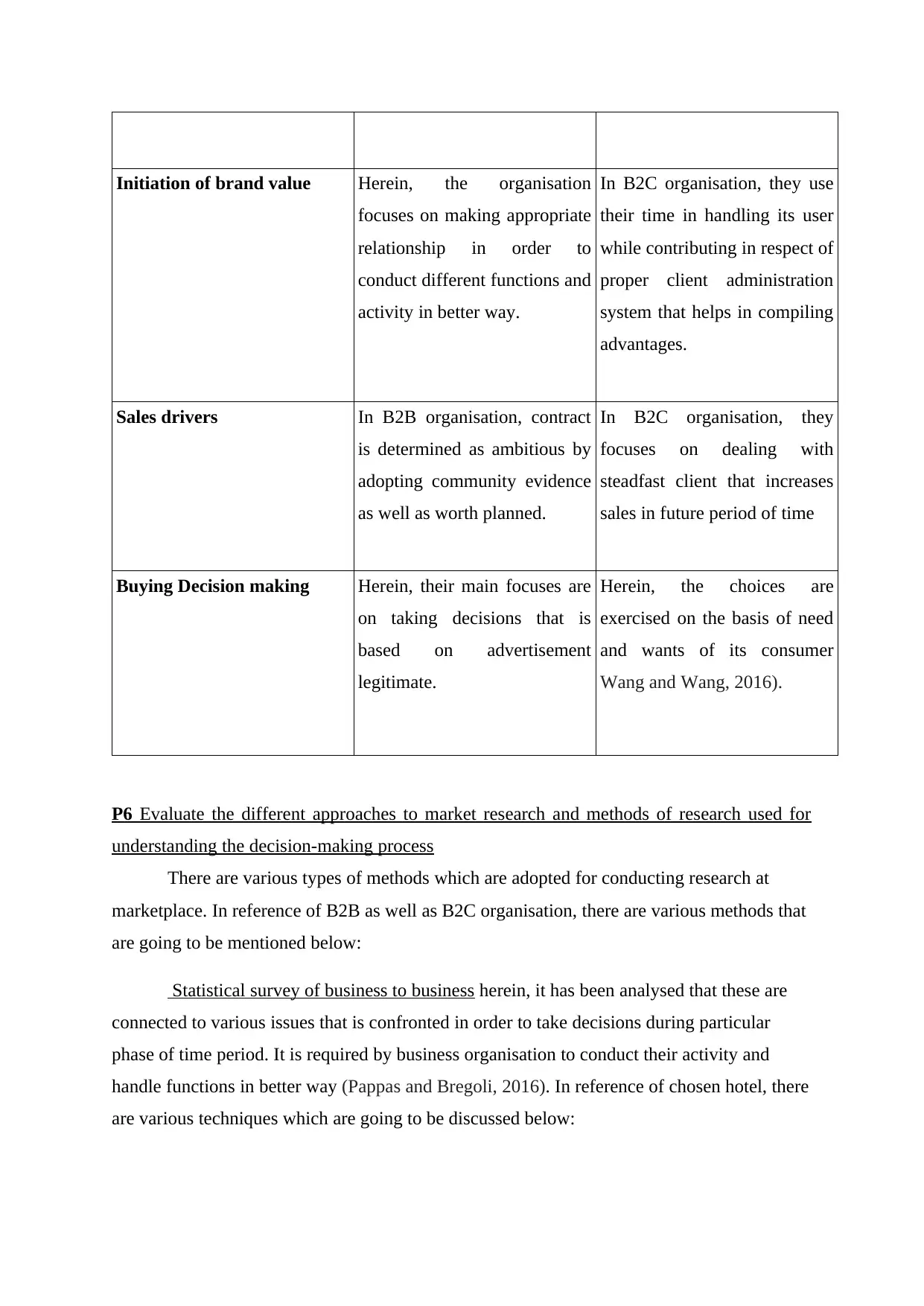
Initiation of brand value Herein, the organisation
focuses on making appropriate
relationship in order to
conduct different functions and
activity in better way.
In B2C organisation, they use
their time in handling its user
while contributing in respect of
proper client administration
system that helps in compiling
advantages.
Sales drivers In B2B organisation, contract
is determined as ambitious by
adopting community evidence
as well as worth planned.
In B2C organisation, they
focuses on dealing with
steadfast client that increases
sales in future period of time
Buying Decision making Herein, their main focuses are
on taking decisions that is
based on advertisement
legitimate.
Herein, the choices are
exercised on the basis of need
and wants of its consumer
Wang and Wang, 2016).
P6 Evaluate the different approaches to market research and methods of research used for
understanding the decision-making process
There are various types of methods which are adopted for conducting research at
marketplace. In reference of B2B as well as B2C organisation, there are various methods that
are going to be mentioned below:
Statistical survey of business to business herein, it has been analysed that these are
connected to various issues that is confronted in order to take decisions during particular
phase of time period. It is required by business organisation to conduct their activity and
handle functions in better way (Pappas and Bregoli, 2016). In reference of chosen hotel, there
are various techniques which are going to be discussed below:
focuses on making appropriate
relationship in order to
conduct different functions and
activity in better way.
In B2C organisation, they use
their time in handling its user
while contributing in respect of
proper client administration
system that helps in compiling
advantages.
Sales drivers In B2B organisation, contract
is determined as ambitious by
adopting community evidence
as well as worth planned.
In B2C organisation, they
focuses on dealing with
steadfast client that increases
sales in future period of time
Buying Decision making Herein, their main focuses are
on taking decisions that is
based on advertisement
legitimate.
Herein, the choices are
exercised on the basis of need
and wants of its consumer
Wang and Wang, 2016).
P6 Evaluate the different approaches to market research and methods of research used for
understanding the decision-making process
There are various types of methods which are adopted for conducting research at
marketplace. In reference of B2B as well as B2C organisation, there are various methods that
are going to be mentioned below:
Statistical survey of business to business herein, it has been analysed that these are
connected to various issues that is confronted in order to take decisions during particular
phase of time period. It is required by business organisation to conduct their activity and
handle functions in better way (Pappas and Bregoli, 2016). In reference of chosen hotel, there
are various techniques which are going to be discussed below:
⊘ This is a preview!⊘
Do you want full access?
Subscribe today to unlock all pages.

Trusted by 1+ million students worldwide
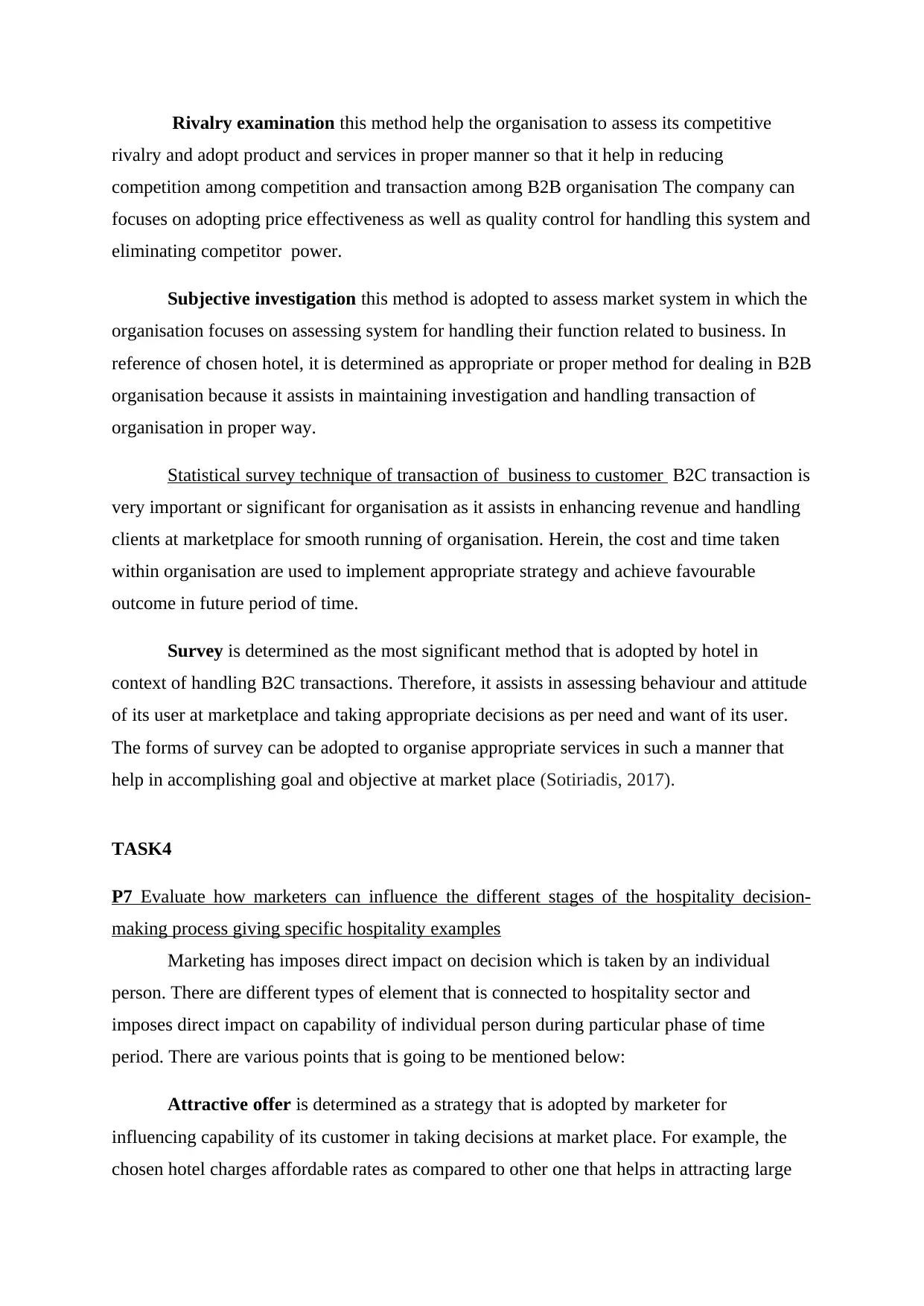
Rivalry examination this method help the organisation to assess its competitive
rivalry and adopt product and services in proper manner so that it help in reducing
competition among competition and transaction among B2B organisation The company can
focuses on adopting price effectiveness as well as quality control for handling this system and
eliminating competitor power.
Subjective investigation this method is adopted to assess market system in which the
organisation focuses on assessing system for handling their function related to business. In
reference of chosen hotel, it is determined as appropriate or proper method for dealing in B2B
organisation because it assists in maintaining investigation and handling transaction of
organisation in proper way.
Statistical survey technique of transaction of business to customer B2C transaction is
very important or significant for organisation as it assists in enhancing revenue and handling
clients at marketplace for smooth running of organisation. Herein, the cost and time taken
within organisation are used to implement appropriate strategy and achieve favourable
outcome in future period of time.
Survey is determined as the most significant method that is adopted by hotel in
context of handling B2C transactions. Therefore, it assists in assessing behaviour and attitude
of its user at marketplace and taking appropriate decisions as per need and want of its user.
The forms of survey can be adopted to organise appropriate services in such a manner that
help in accomplishing goal and objective at market place (Sotiriadis, 2017).
TASK4
P7 Evaluate how marketers can influence the different stages of the hospitality decision-
making process giving specific hospitality examples
Marketing has imposes direct impact on decision which is taken by an individual
person. There are different types of element that is connected to hospitality sector and
imposes direct impact on capability of individual person during particular phase of time
period. There are various points that is going to be mentioned below:
Attractive offer is determined as a strategy that is adopted by marketer for
influencing capability of its customer in taking decisions at market place. For example, the
chosen hotel charges affordable rates as compared to other one that helps in attracting large
rivalry and adopt product and services in proper manner so that it help in reducing
competition among competition and transaction among B2B organisation The company can
focuses on adopting price effectiveness as well as quality control for handling this system and
eliminating competitor power.
Subjective investigation this method is adopted to assess market system in which the
organisation focuses on assessing system for handling their function related to business. In
reference of chosen hotel, it is determined as appropriate or proper method for dealing in B2B
organisation because it assists in maintaining investigation and handling transaction of
organisation in proper way.
Statistical survey technique of transaction of business to customer B2C transaction is
very important or significant for organisation as it assists in enhancing revenue and handling
clients at marketplace for smooth running of organisation. Herein, the cost and time taken
within organisation are used to implement appropriate strategy and achieve favourable
outcome in future period of time.
Survey is determined as the most significant method that is adopted by hotel in
context of handling B2C transactions. Therefore, it assists in assessing behaviour and attitude
of its user at marketplace and taking appropriate decisions as per need and want of its user.
The forms of survey can be adopted to organise appropriate services in such a manner that
help in accomplishing goal and objective at market place (Sotiriadis, 2017).
TASK4
P7 Evaluate how marketers can influence the different stages of the hospitality decision-
making process giving specific hospitality examples
Marketing has imposes direct impact on decision which is taken by an individual
person. There are different types of element that is connected to hospitality sector and
imposes direct impact on capability of individual person during particular phase of time
period. There are various points that is going to be mentioned below:
Attractive offer is determined as a strategy that is adopted by marketer for
influencing capability of its customer in taking decisions at market place. For example, the
chosen hotel charges affordable rates as compared to other one that helps in attracting large
Paraphrase This Document
Need a fresh take? Get an instant paraphrase of this document with our AI Paraphraser
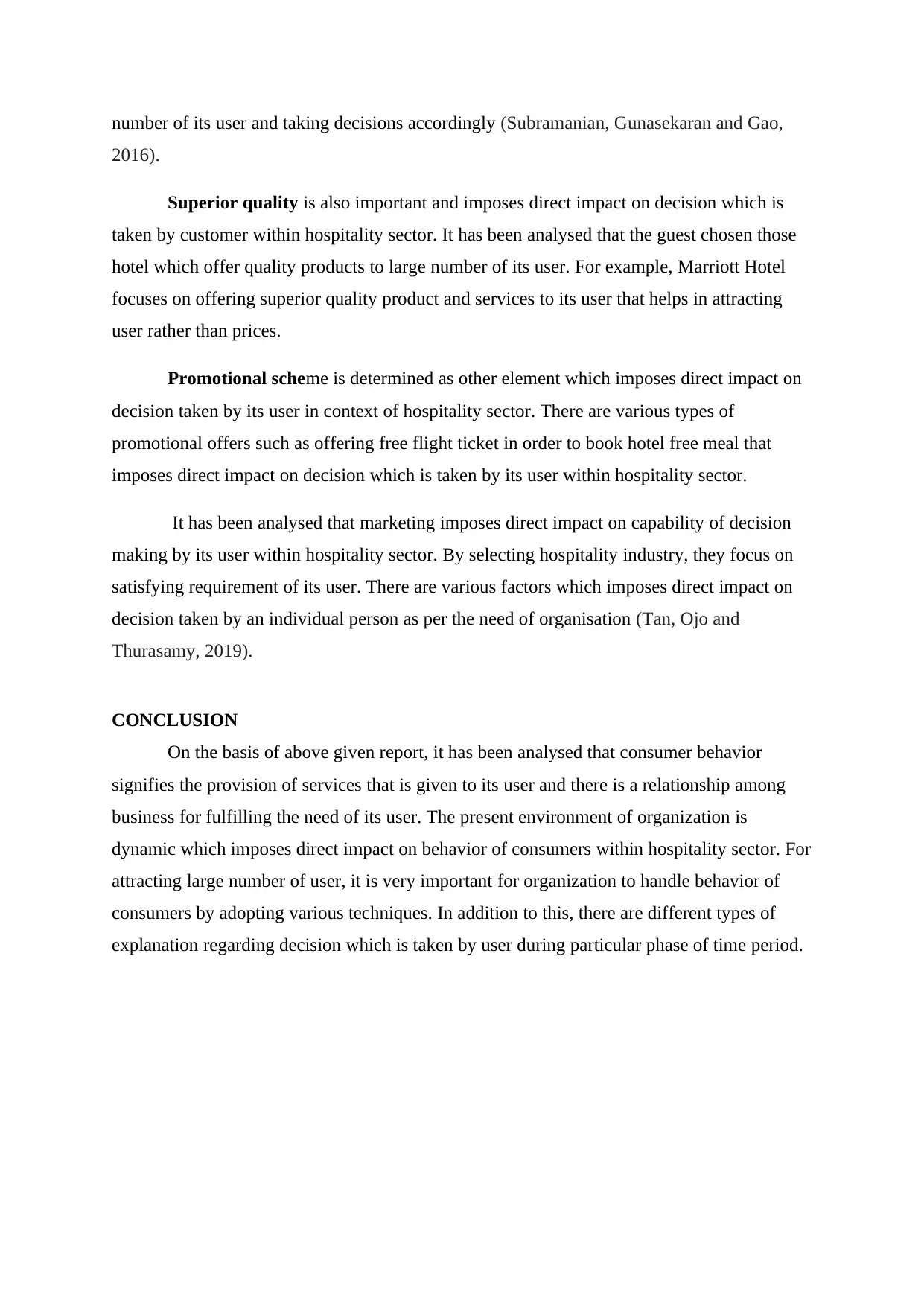
number of its user and taking decisions accordingly (Subramanian, Gunasekaran and Gao,
2016).
Superior quality is also important and imposes direct impact on decision which is
taken by customer within hospitality sector. It has been analysed that the guest chosen those
hotel which offer quality products to large number of its user. For example, Marriott Hotel
focuses on offering superior quality product and services to its user that helps in attracting
user rather than prices.
Promotional scheme is determined as other element which imposes direct impact on
decision taken by its user in context of hospitality sector. There are various types of
promotional offers such as offering free flight ticket in order to book hotel free meal that
imposes direct impact on decision which is taken by its user within hospitality sector.
It has been analysed that marketing imposes direct impact on capability of decision
making by its user within hospitality sector. By selecting hospitality industry, they focus on
satisfying requirement of its user. There are various factors which imposes direct impact on
decision taken by an individual person as per the need of organisation (Tan, Ojo and
Thurasamy, 2019).
CONCLUSION
On the basis of above given report, it has been analysed that consumer behavior
signifies the provision of services that is given to its user and there is a relationship among
business for fulfilling the need of its user. The present environment of organization is
dynamic which imposes direct impact on behavior of consumers within hospitality sector. For
attracting large number of user, it is very important for organization to handle behavior of
consumers by adopting various techniques. In addition to this, there are different types of
explanation regarding decision which is taken by user during particular phase of time period.
2016).
Superior quality is also important and imposes direct impact on decision which is
taken by customer within hospitality sector. It has been analysed that the guest chosen those
hotel which offer quality products to large number of its user. For example, Marriott Hotel
focuses on offering superior quality product and services to its user that helps in attracting
user rather than prices.
Promotional scheme is determined as other element which imposes direct impact on
decision taken by its user in context of hospitality sector. There are various types of
promotional offers such as offering free flight ticket in order to book hotel free meal that
imposes direct impact on decision which is taken by its user within hospitality sector.
It has been analysed that marketing imposes direct impact on capability of decision
making by its user within hospitality sector. By selecting hospitality industry, they focus on
satisfying requirement of its user. There are various factors which imposes direct impact on
decision taken by an individual person as per the need of organisation (Tan, Ojo and
Thurasamy, 2019).
CONCLUSION
On the basis of above given report, it has been analysed that consumer behavior
signifies the provision of services that is given to its user and there is a relationship among
business for fulfilling the need of its user. The present environment of organization is
dynamic which imposes direct impact on behavior of consumers within hospitality sector. For
attracting large number of user, it is very important for organization to handle behavior of
consumers by adopting various techniques. In addition to this, there are different types of
explanation regarding decision which is taken by user during particular phase of time period.
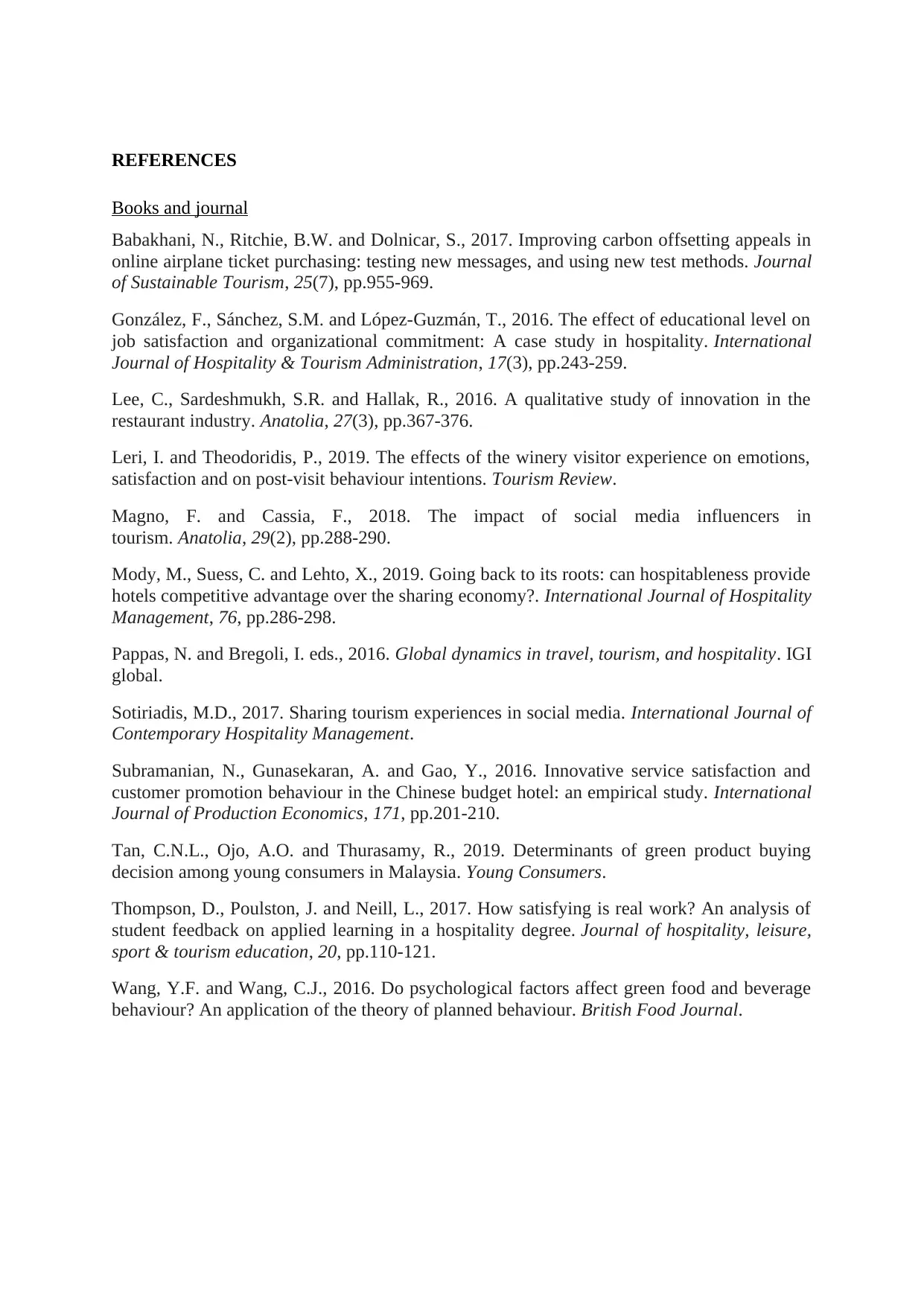
REFERENCES
Books and journal
Babakhani, N., Ritchie, B.W. and Dolnicar, S., 2017. Improving carbon offsetting appeals in
online airplane ticket purchasing: testing new messages, and using new test methods. Journal
of Sustainable Tourism, 25(7), pp.955-969.
González, F., Sánchez, S.M. and López-Guzmán, T., 2016. The effect of educational level on
job satisfaction and organizational commitment: A case study in hospitality. International
Journal of Hospitality & Tourism Administration, 17(3), pp.243-259.
Lee, C., Sardeshmukh, S.R. and Hallak, R., 2016. A qualitative study of innovation in the
restaurant industry. Anatolia, 27(3), pp.367-376.
Leri, I. and Theodoridis, P., 2019. The effects of the winery visitor experience on emotions,
satisfaction and on post-visit behaviour intentions. Tourism Review.
Magno, F. and Cassia, F., 2018. The impact of social media influencers in
tourism. Anatolia, 29(2), pp.288-290.
Mody, M., Suess, C. and Lehto, X., 2019. Going back to its roots: can hospitableness provide
hotels competitive advantage over the sharing economy?. International Journal of Hospitality
Management, 76, pp.286-298.
Pappas, N. and Bregoli, I. eds., 2016. Global dynamics in travel, tourism, and hospitality. IGI
global.
Sotiriadis, M.D., 2017. Sharing tourism experiences in social media. International Journal of
Contemporary Hospitality Management.
Subramanian, N., Gunasekaran, A. and Gao, Y., 2016. Innovative service satisfaction and
customer promotion behaviour in the Chinese budget hotel: an empirical study. International
Journal of Production Economics, 171, pp.201-210.
Tan, C.N.L., Ojo, A.O. and Thurasamy, R., 2019. Determinants of green product buying
decision among young consumers in Malaysia. Young Consumers.
Thompson, D., Poulston, J. and Neill, L., 2017. How satisfying is real work? An analysis of
student feedback on applied learning in a hospitality degree. Journal of hospitality, leisure,
sport & tourism education, 20, pp.110-121.
Wang, Y.F. and Wang, C.J., 2016. Do psychological factors affect green food and beverage
behaviour? An application of the theory of planned behaviour. British Food Journal.
Books and journal
Babakhani, N., Ritchie, B.W. and Dolnicar, S., 2017. Improving carbon offsetting appeals in
online airplane ticket purchasing: testing new messages, and using new test methods. Journal
of Sustainable Tourism, 25(7), pp.955-969.
González, F., Sánchez, S.M. and López-Guzmán, T., 2016. The effect of educational level on
job satisfaction and organizational commitment: A case study in hospitality. International
Journal of Hospitality & Tourism Administration, 17(3), pp.243-259.
Lee, C., Sardeshmukh, S.R. and Hallak, R., 2016. A qualitative study of innovation in the
restaurant industry. Anatolia, 27(3), pp.367-376.
Leri, I. and Theodoridis, P., 2019. The effects of the winery visitor experience on emotions,
satisfaction and on post-visit behaviour intentions. Tourism Review.
Magno, F. and Cassia, F., 2018. The impact of social media influencers in
tourism. Anatolia, 29(2), pp.288-290.
Mody, M., Suess, C. and Lehto, X., 2019. Going back to its roots: can hospitableness provide
hotels competitive advantage over the sharing economy?. International Journal of Hospitality
Management, 76, pp.286-298.
Pappas, N. and Bregoli, I. eds., 2016. Global dynamics in travel, tourism, and hospitality. IGI
global.
Sotiriadis, M.D., 2017. Sharing tourism experiences in social media. International Journal of
Contemporary Hospitality Management.
Subramanian, N., Gunasekaran, A. and Gao, Y., 2016. Innovative service satisfaction and
customer promotion behaviour in the Chinese budget hotel: an empirical study. International
Journal of Production Economics, 171, pp.201-210.
Tan, C.N.L., Ojo, A.O. and Thurasamy, R., 2019. Determinants of green product buying
decision among young consumers in Malaysia. Young Consumers.
Thompson, D., Poulston, J. and Neill, L., 2017. How satisfying is real work? An analysis of
student feedback on applied learning in a hospitality degree. Journal of hospitality, leisure,
sport & tourism education, 20, pp.110-121.
Wang, Y.F. and Wang, C.J., 2016. Do psychological factors affect green food and beverage
behaviour? An application of the theory of planned behaviour. British Food Journal.
⊘ This is a preview!⊘
Do you want full access?
Subscribe today to unlock all pages.

Trusted by 1+ million students worldwide
1 out of 13
Related Documents
Your All-in-One AI-Powered Toolkit for Academic Success.
+13062052269
info@desklib.com
Available 24*7 on WhatsApp / Email
![[object Object]](/_next/static/media/star-bottom.7253800d.svg)
Unlock your academic potential
Copyright © 2020–2025 A2Z Services. All Rights Reserved. Developed and managed by ZUCOL.

